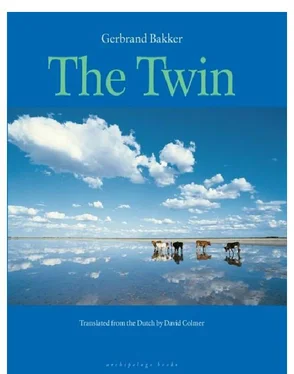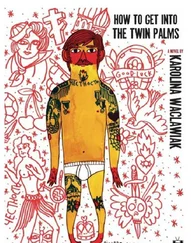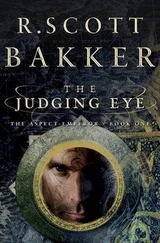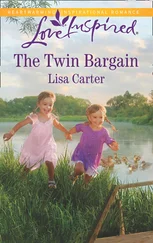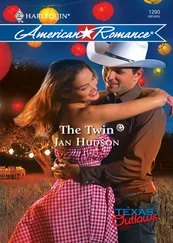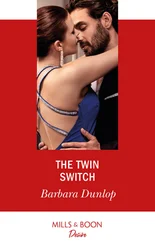As long as Henk was laid out in the living room, Riet spent every day at our house. She arrived early in the morning and went home late at night. We couldn’t leave the coffin open for long because Henk had drowned. The temperature had plummeted during the night of the nineteenth and we kept the two sash windows ajar. Mother and Riet sat in the kitchen doing nothing all day. Now and then someone would visit, grandparents mostly, three of whom were still alive in 1967. Father and I avoided each other and did our best to stay outside as much as possible. Being inside the house was unbearable. The two women sat silently in the kitchen, Henk was laid out in the cold living room, and at night I couldn’t sleep because I was afraid I would start to smell him. Two days after the accident I cycled to Amsterdam to attend a couple of lectures. On the way there I stood for a long time at the top of Schellingwoude Bridge, staring at the Orange Locks. I know with absolute certainty that I had a philology lecture on the nineteenth because when I came home Mother said that Henk was dead. The lectures I had before or after that date have completely faded from my memory. On the way back I stopped again for a long time at the top of Schellingwoude Bridge, now staring out over the Outer IJ, postponing the moment I would start pedaling again. That year the bridge was celebrating its tenth anniversary. I felt that I would be forgotten: Father and Mother were the parents, Riet was the almost-wife, I was just the brother.
Since that day almost every journey I make is north, I no longer go south of the village.
After the funeral Riet was still shivering, chilled to the bone by guilt and the icy water of Lake IJssel. Everyone else had left, the four of us were sitting in the kitchen: Riet in Henk’s place, with the light from the side window behind her. Father raised his empty coffee cup and jiggled the spoon back and forth, staring down at the tabletop. Mother got up and silently poured another cup. Henk could do that too, make his spoon jump in his cup, but he smiled at me while he was doing it and he thanked Mother after she’d filled his cup. I saw Riet looking at Father. He stirred the milk skin into his coffee. Then she looked at me. In her eyes I saw again the bewilderment with which she had looked at me the night she met Henk. I don’t remember talking to her. She did her talking with Mother. It was a week of silence.
She must have had a job, I don’t remember. Three days later she was still at our house, as if she didn’t know what to do next. She infected Mother with her mood. They’d walk around together, often to the Bosman windmill, as if they knew it was a place that meant a lot to Henk. She ate with us, and that was completely natural. At least for Mother and me. Not for Father. That evening, if I’m counting properly it must have been the 26th of April, he worked his way through his meal in silence. Just after shoving a forkful of potato into his mouth he spoke to Riet, it was virtually the only thing he said to her in that whole week of silence, “I want you to go away and never come back.”
She put down her knife and fork — she was the only one who ate with knife and fork — neatly alongside her half-empty plate, slid her chair back and stood up. “Fine,” she said calmly, as if she’d expected it, as if she’d been waiting for it. She walked to the hall, put on her coat and left through the front door. Mother started to cry. I got up and walked over to the front window. I saw her turning onto the road, on her bike. That’s how I remember Riet: her back bent (she had a headwind), her blonde hair fluttering, riding her bike down a narrow, empty road that got emptier and emptier towards the dyke. She disappeared, just like the red light had in November, behind the window frame.
Father had more to say, “And you’re done there in Amsterdam.”
I became Father’s boy. Mother didn’t stop crying.
I’m skating. After four nights of frost Big Lake has frozen over except for an oval-shaped hole in the middle. If I keep an eye on the ducks, coots and moorhens, I’m safe enough. The Amsterdammers haven’t shown up yet, they don’t know it’s already skateable. During the last real freeze, years ago, I bought a pair of racing skates because I wanted to skate corners. You can’t skate corners on Frisian skates. Now I’m skating corners, faster and faster, wider and wider. I go down a little lower on my stiff knees. The faster I go, the less cracks appear in the ice, which is black in places. Skating before Christmas — it’s been a long time. About a dozen Shetland ponies watch me stupidly, they don’t see ice, they see smooth water. When my knees and lower back can take no more, I finally have to brake to stop myself from flying into the bone-dry undergrowth along the east side of the lake. If it stays this cold, I’ll be able to skate to Monnickendam in a few days and maybe do a circuit around Watergang or Ilpendam.
I learned to skate without Henk and without Father. Father is scared of frozen water, although he’d never admit it. We did everything together, Henk and I, except skating. The farmhand taught me how to skate, Mother encouraged me. She skated on figure skates, turning elegant pirouettes, doing figure of eights and regularly shouting, “That’s right!” The farmhand didn’t pull me along, which I think is the usual way of teaching someone how to skate; he pushed me. His big hands enclosed my bottom like the seat of a chair, he bent his knees so much he was almost squatting. When I shouted stop, he braked and held me back by wrapping his hands around my hips. As I remember it, he skated around with me like that for hours. Long after Mother had finished her figure of eights. But it can’t have been like that. Father must have strode out into the field to remind him sharply that he had more important things to do than entertain himself on the ice. He would have glared at me-a six- or seven-year-old kid — because Henk was doing the yearlings. Or collecting eggs, perhaps tail docking. Mother would have been downcast in the kitchen, back at work, because even she would have had an earful. Skating with the farmhand, what was she thinking?
That might have been the day that Father — simply because I was having fun doing something else — decided for himself that Henk would be the farmer, even though I was the oldest, if just by a couple of minutes. Henk helped Father, I went skating and treated the farmhand as an equal. Maybe it was just one incident in a series of events that made Father conclude I wasn’t suited to succeed him. After Henk died Father had to make do with me, but in his eyes I always remained second choice.

A few long strokes carry me to the place in the reeds where I have left my clogs. I take my skates off and look out at the water birds. Father calls coots and moorhens “water hens” because he always gets them mixed up. Later today I’ll go and see how the frost flowers on his windows are doing.
Frost flowers remind me of Henk and his warm bed.
Even before I reach the road I see the livestock dealer’s truck turning into the yard. I don’t hurry. He’ll go looking for me but, before he’s been everywhere, I’ll be home. My thoughts catch on the word “everywhere,” and immediately I see the livestock dealer standing on the blue carpet next to Father’s bed, cap in hand, silent, wriggling his toes and looking serious. Father isn’t silent, he jabbers and gabbles and keeps talking until I come into the room. I hurry, the frost-covered grass crunching under my clogs. I swing my legs over the last gate and run into the yard.
The livestock dealer emerges from the barn. When he sees me he makes to raise his cap but changes his mind. “You’ve got a few good calves in there,” he says.
Читать дальше
